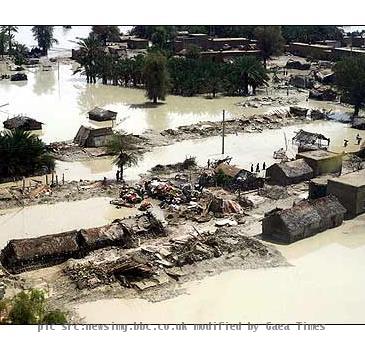Floods leave Pakistani textile firms in need of Indian cotton
By Awais Saleem, IANSMonday, October 18, 2010
ISLAMABAD - Pakistan’s textile industry, hit by a record hike in cotton prices following a massive crop damage in the recent floods, has become dependent on the import of clothing material from India to sustain its order books, say experts.
Pakistani cotton traders worry that any cancellation of Indian contracts or even delays in shipments would spell trouble for the industry, which accounts for about 60 percent of the country’s total exports.
Textile firms in the world’s third-largest cotton consuming country look to neighbouring India, the world’s second-largest producer, after the massive damage to their domestic crop, resulting in an estimated shortfall of about 3 million bales, according to Dawn.
Industry officials said traders in Pakistan had booked one million bales for delivery from November to January from India but said India has now stopped registering cotton exports applications of about 5.5 million bales, based on official information.
“This has given an excuse to some Indian exporters who say they could not get themselves registered as they were expecting the registration process to go on for a month,” said Naseem Usman, chairman of the Karachi-based Cotton Brokers Forum.
“Now some people are saying we may get only 25 percent of the total contracts booked or the shipments may be delayed,” he said. “The uncertainty about the Indian deals sent cotton prices soaring in the domestic market.”
Cotton price in Pakistan has reached as high as Rs.7,600 (about $88) per maund (which equals 37.32 kg).
“Some Indian exporters are saying they want to deliver their orders, but are facing difficulties from their government,” said S.M. Imran, a senior textile official whose mill imports Indian cotton.
“It appeared Indian exporters were looking to escape their contracts and some Karachi-based traders said it was because of rising international cotton prices.”
Meanwhile, US cotton price climbed to a record high in early Asian trade Friday, reaching $1.198 per pound, buoyed by a rally in Chinese cotton prices and a wider weakening trend in the US dollar.
“If we don’t receive the cotton at this time, prices of cotton will go higher and that will create further problems,” Imran said.
Pakistan in April hoped to produce 14 million bales of cotton in the 2010-11 season, compared with about 12.7 million bales in the previous season, when the country had to import about 2 million bales.
Because of floods, government and industry officials now estimate an output of about 11.6 million bales of 170 kg (374.8lb) each.
Flash floods in August and September had left more than 20 million people displaced and over one million acres of fertile land submerged. The areas in south Punjab and interior Sindh, the largest procuders of cotton, the most affected that incidentally.
(Awais Saleem can be contacted at ians.pakistan@gmail.com)
